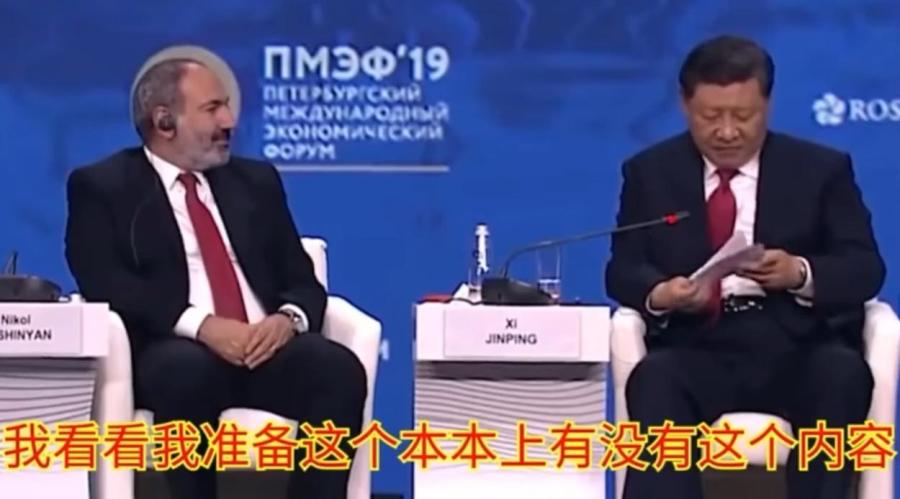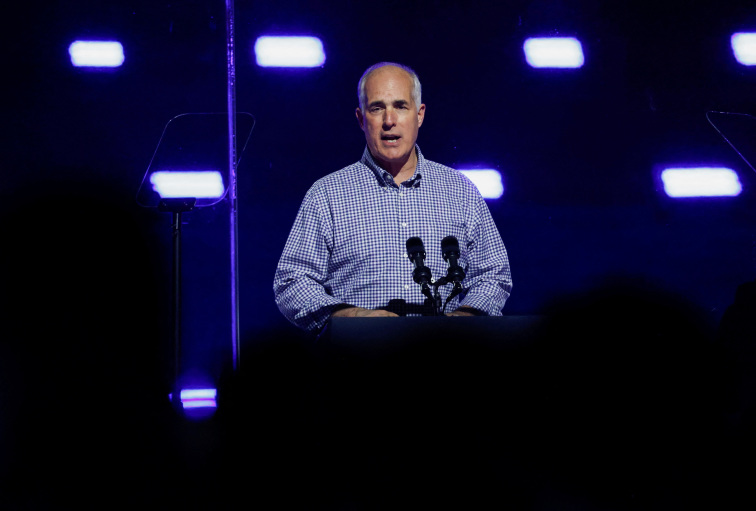At the 2019 St. Petersburg International Economic Forum (SPIEF), during the plenary session, Xi Jinping, in response to a question from a Russian journalist, flipped through a small booklet in his hand, saying: "Let me see if this content is in my prepared notes..." His response prompted laughter from the audience. (Video screenshot)
[People News] Recently, major upheavals have rocked the CCP’s military, with reports emerging of several high-ranking officials being detained. Those reportedly taken into custody include the newly appointed Minister of Defense Dong Jun, Director of the Central Military Commission’s Political Work Department Miao Hua, Central Military Commission member Liu Zhenli, and Deputy Director of the Central Theater Command Air Force’s Political Department Yao Danjiang. These developments have drawn significant public attention, particularly because the fallen military leaders were all personally promoted by Xi Jinping. As a result, widespread doubts have arisen about Xi’s ability to assess talent, lead the military, and govern the country effectively.
Dong Jun: A Figurehead Defense Minister
The news of the ousting of the newly appointed Defense Minister Dong Jun comes from the UK’s Financial Times. On November 27, the Financial Times reported that Dong Jun, along with Li Shangfu, was removed from office during his tenure as defense minister. Including Wei Fenghe, who was removed after stepping down, this marks three consecutive defense ministers dismissed under the CCP—a highly unusual event in both Chinese and international history. The report suggests that Dong’s case is part of a broader anti-corruption investigation.
According to the CCP’s narrative, Dong’s two predecessors, Li Shangfu and Wei Fenghe, were expelled from the party for "serious violations of discipline" related to taking massive bribes. However, corruption is deeply entrenched in the CCP’s bureaucracy, and such accusations are unlikely to be the true reason for their dismissals. So, what is the real story behind Dong Jun’s removal?
Observers have long noted that after Dong Jun became defense minister, he was never promoted to the six-member Central Military Commission (CMC) nor appointed as a State Councilor, leaving him as a defense minister without actual power—a mere mouthpiece for Xi Jinping. Dong Jun’s position came about through the recommendation of Miao Hua, which brought him to Xi’s attention. With Miao Hua recently detained, Dong Jun’s downfall became inevitable.
Unfavorable reports about Miao Hua had surfaced earlier. In February, freelance writer Du Zheng wrote in the Taiwanese media Up Media that Miao Hua was a "silent giant tiger" (a metaphor for significant corruption) in the military. Miao, who oversaw political work, placed his loyalists throughout the army, ensuring that all military political commissars were his allies and informants. Military promotions required his approval before being submitted to Xi, and officials needed Miao’s backing to advance their careers. If corruption is the measure, Miao Hua might well be the "most corrupt figure in the military."
On November 11, independent commentator Cai Shenkun and former PLA Navy officer Yao Cheng revealed on the X platform that Miao Hua had been taken away by the CMC’s disciplinary commission. This development suggests that the faction within the military loyal to Xi Jinping is being purged by Zhang Youxia. Consequently, Admiral Dong Jun, the recently appointed defense minister, might also be implicated.
Dong Jun and Li Shangfu were both removed less than ten months into their terms as defense ministers—barely long enough to warm their seats. This reflects the chaos within the CCP’s military, driven by corruption and factional struggles, which stem from Xi Jinping’s inability to lead the military effectively.
The consecutive downfall of three defense ministers personally appointed by Xi, as well as the abrupt dismissal of Foreign Minister Qin Gang within a year of his appointment, has led to widespread criticism of Xi’s judgment. According to incomplete statistics on Wikipedia, since the CCP’s 18th National Congress, officials publicly investigated include one at the national level, eight at the vice-national level, four CMC-level members, dozens of provincial-level officials, and hundreds of vice-provincial-level officials across ministries such as defense, foreign affairs, agriculture, and finance. This pattern has led to growing skepticism about Xi’s ability to govern and lead. Critics argue that Xi prioritizes absolute loyalty to himself and the Communist Party over competence and loyalty to the country. This self-serving approach undermines military strength and leaves the government’s key positions occupied by unqualified officials, unable to rejuvenate the economy or ensure national stability and prosperity. As a result, Chinese netizens have mocked Xi Jinping as a "straw bag" (a term implying incompetence) and "Baozi" (a reference to his perceived mediocrity).
Hinting at Retiring to a Secondary Role
According to political commentator Su Xiaohe, following Donald Trump’s victory in the U.S. presidential election, Xi Jinping made overtures to improve U.S.-China relations. On the suggestion of China’s Foreign Minister Wang Yi, Xi even proposed granting an interview to U.S. media.
It is widely known that Xi Jinping, along with North Korean leader Kim Jong-un and Iran’s Supreme Leader, is among the few world leaders who refuse face-to-face media interviews. In Xi's case, any media interaction is preconditioned on the submission of predetermined questions, and he struggles to answer anything beyond the agreed script.
A viral video on Twitter, dubbed the "Insulting Xi Video," features an excerpt from Xi’s remarks at the 2019 St. Petersburg International Economic Forum (SPIEF). During the plenary session, a Russian female journalist asked Xi a lengthy question. Xi remained silent for a long moment before slowly flipping through a small notebook in his hand, saying, "Let me check if this question is covered in my prepared notes..." The audience burst into laughter, followed by the translator repeating his exact words. Xi could only sit stiffly, forcing a smile.
This incident revealed to the world that without a prepared script, Xi cannot speak coherently, let alone handle media interviews.
This time, in an effort to improve relations with the United States, Wang Yi suggested that Xi Jinping grant an interview to American media. However, the questions had to be provided to the journalists by the Chinese side. Wang Yi also revealed that during the interview, Xi planned to announce a significant decision: his intention to step back to a secondary role at an appropriate time. However, stepping back comes with three conditions. The first is that the next leader of the CCP must be someone personally approved by Xi. He will not relinquish power if someone is imposed upon him, as he would not feel secure. Wang emphasized that this is Xi’s bottom line.
Beijing insiders argue that Xi Jinping’s claim of stepping back to a secondary role is nothing more than a lie. As long as his successor is someone approved by Xi, it would essentially mean that Xi has not truly retired. This has led the military to believe that Xi cannot be trusted and must be removed entirely. They insist on stripping Xi of the power to appoint his successor, preventing him from manipulating the process to serve his own interests.
Condition Two: Ending the Trade War and Avoiding Accountability. Xi has reportedly expressed a willingness to end the trade war with the U.S. and accept Trump’s conditions. This includes halting the flow of fentanyl into the U.S. via Mexico. However, in return, Xi demands that Trump pledge not to pursue accountability for the origins of COVID-19, thereby avoiding any reparations by the CCP. Xi also insists that the U.S. must not freeze the assets of top CCP officials held in the U.S., including the vast wealth belonging to the families of Xi Jinping, Wang Qishan, Deng Xiaoping, Jiang Zemin, and others.
Condition Three: Compliance with U.S.-Dictated Trade Rules. Xi has agreed to implement trade rules as dictated by Trump, reportedly stating, “Whatever Trump says goes,” due to his lack of time to address China’s deteriorating economic situation.
Under Xi Jinping’s leadership, China’s economy has been driven to the brink of collapse. Social tensions have escalated dramatically, with an increase in violent retaliatory acts, reflecting widespread discontent and insecurity. While Xi’s potential retreat to a secondary role might appear to be a strategy to evade responsibility, it remains unclear whether such a move would shield him from accountability.
(Original report from People News)











News magazine bootstrap themes!
I like this themes, fast loading and look profesional
Thank you Carlos!
You're welcome!
Please support me with give positive rating!
Yes Sure!